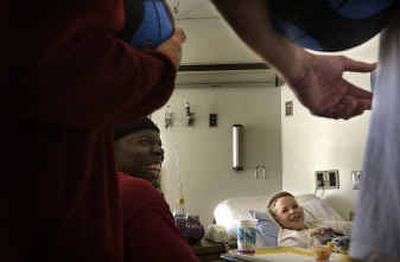Best of Hoopfest make time for kids

Before the competition starts to simmer, before the first teams begin their dance around the pavement, Hoopfest weekend begins with a trip to the hospital.
Members of Team Atlanta – Hoopfest’s 2001 and 2003 winners – and Team Fresno flew into Spokane early Friday to spend time with young patients at Deaconess and Sacred Heart medical centers and Shriners Hospital.
Ross Muelheim, 10, was discharged from Deaconess on Wednesday, but he came back with his friend David Eisenrich, also 10, just to see the players.
“It’s awesome,” said Muelheim, who comes to Deaconess often for medical treatment. Having met the players each time they visited the hospital for the past four years, he watched them with a mix of appreciation and awe.
“They’re just really good,” added Eisenrich. “They win Hoopfest a lot.”
The idea for hospital visits started with Brendon Hill, who’s been with Hoopfest for 12 years. This year he’s on the operating committee and in charge of cleanup.
In 1999, his son Gresham was diagnosed with a tumor in his spine. While in the hospital, Gresham and the other kids got a visit from the Gonzaga University basketball team. Though it didn’t have much effect on his son, who was just 1 at the time, Hill saw how the visit was a bright spot for the parents, nurses and older kids.
After Hoopfest each year, organizers talk about how to make the event better. One idea was to give the elite athletes more superstar treatment. Thinking back to the time spent in the hospital with his son, who is now healthy and cancer-free, Hill suggested hospital visits. In 2001, he kicked off a tradition.
“We really didn’t know what we were getting into,” he said.
After the visits that year, Hoopfest received a letter from Deaconess about the difference the athletes made in the life of one boy in particular. After meeting the elite team members, he and his family went to watch them at Hoopfest, giving them the most normal day they’d had in a long time. The boy, who had a terminal illness, died two days later.
Hill read the letter to many of the Hoopfest volunteers to illustrate how Hoopfest is about more than basketball – it’s about community.
“We do it to say, ‘Here we are about to have this community event, and we don’t want you to think we forgot about you,’ ” Hill said.
This year, the Sonics Dance Team also visited Sacred Heart on a “Get Well Tour,” signing autographs and handing out goodie bags.
“You get caught up in so much of the fun and hoopla of basketball, and you have to remember you can’t take things for granted,” said Team Atlanta member Charles Burkett, who’s a high school coach when he’s not playing 3-on-3. “There are these kids here who wish they could do what we’re doing. For us to just show our support for them is gratifying.”
Team members filed into rooms cheered by stuffed animals and Mylar balloons. They left autographs for a girl who was sleeping. They asked other kids their names and ages and whether they liked basketball. They urged the patients to watch for them Sunday in the championship game. They joked playfully with one another, setting up a south vs. west rivalry.
“Watch for the big, strong guys from the South,” Team Atlanta member Bill McNair advised a 13-year-old patient named Junior Creekmore, who was quickly nicknamed “Number Two.”
A 7-year-old girl from Montana answered all the players’ questions with a quick nod or shy shake of the head until the group turned to go. Then she pulled out a “Shrek 2” coloring book and turned to a page of stickers.
“Scratch them – they smell,” she said, and they all did.
The players gave mini-basketballs to each patient and left them with a few words of encouragement:
“Keep on getting well,” they said.
“We get energized by it – just bringing a smile to someone’s face,” said McNair, who’s been visiting Spokane hospitals before Hoopfest for five years. “We just want to let them know there is hope out there.”